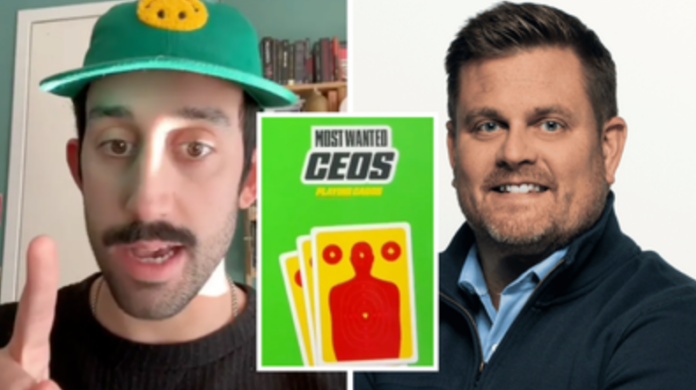If you ever wondered how far-left radicals would spin murder into marketing, look no further than Comrade Workwear’s latest stunt: a deck of “Most Wanted CEOs” playing cards.
Modeled after the infamous deck used by U.S. intelligence to identify Saddam Hussein’s regime members in 2003, this set of cards is apparently intended to “bond workers” over their shared grievances with capitalism. Never mind that the idea is being peddled by a for-profit company capitalizing on anti-capitalist rage. You can’t make this stuff up.
Comrade Workwear’s founder, James Harr, unveiled the plan on TikTok, eagerly soliciting feedback from his followers. Harr outlined his vision: each suit would represent a different industry—clubs for pharmaceuticals, hearts for basic survival industries like retail and real estate, diamonds for tech and media, and spades for oil and defense. Specific CEOs, presumably those Harr finds most objectionable, will be featured on the cards.
If that weren’t edgy enough, Harr posted videos celebrating the Dec. 4 murder of UnitedHealthcare CEO Brian Thompson in New York City, calling the killer his “hero” and the widespread glee over Thompson’s death “awesome.” It’s worth noting that Harr also reminded his followers that assassinating CEOs won’t change capitalism, offering the sage advice to “focus on the system” instead of individuals. Charming.
Comrade Workwear markets itself as a socialist brand, claiming to spark “meaningful discourse” about capitalism while hawking sweatshirts, T-shirts, and now playing cards.
Harr frames the cards as educational tools, telling FOX Business they’ll help workers identify “who is making their life harder” and “who is profiting off their suffering.” That’s rich, coming from a man who profits off selling anti-capitalist merchandise.
What’s more, Harr is quick to condemn the media for covering Thompson’s assassination as violence, accusing them of ignoring the “daily violence” CEOs allegedly inflict on workers. Apparently, in Harr’s warped logic, the systemic injustices of capitalism justify glorifying real-world violence, as long as it’s aimed at the “right” people.
The hypocrisy here is staggering. Harr decries the evils of capitalism while exploiting a tragedy to sell merchandise. He glorifies violence in one breath and walks it back in the next, claiming he doesn’t really endorse harm while lavishing praise on a murderer. This is not activism; it’s nihilism dressed up as political commentary.
For all its bluster about community and liberation, Comrade Workwear is just another example of how the far left’s rhetoric devolves into a bizarre mix of performative outrage and self-serving commercialism. Harr isn’t dismantling capitalism—he’s cashing in on its mechanisms while marketing himself as a revolutionary.


